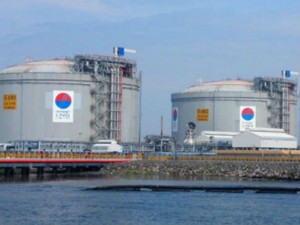In what could be seen as a major victory for India’s energy diplomacy, Qatar has halved the price of gas it sells under a 25-year contract and waived a payment liability of Rs 12,000 crore (around USD 2 billion) arising from India’s refusal to import the committed number of shipments in 2015 under the ‘take-or-pay’ clause. Under the ‘take or pay’ clause, the importer would have had to pay for the entire contracted amount as the off-take was less than 90 per cent.
On December 31, India’s largest importer of gas in ships Petronet LNG, and Qatar’s RasGas agreed to a new pricing formula that would see gas price dropping to USD 6-7 per unit from the original USD 12-13. India is the second liquid gas buyer from Qatar after China to have successfully renegotiated a long-term contract in tune with the changed reality of slump in prices and supply glut in the global energy market.
Describing the renegotiated deal as a “win-win”, India’s Minister for Petroleum and Natural Gas Dharmendra Pradhan said it was the outcome of “statesmanship” shown by the leaders of the two countries. India and Qatar had reached a consensus on the need to reopen the deal in the backdrop of low global oil and gas prices, during Qatari Emir Sheikh Tamim bin Hamad Al-Thani’s visit to India in March. Mr Pradhan reinforced that consensus during his visit to Doha in November at the head of a delegation that included Petronet MD Prabhat Singh.
As per the revised contract, Petronet will now buy the volumes not taken in 2015 during the remaining term of the contract, a Petronet-RasGas statement said. “The deal will help Indian LNG consumers save Rs 4,000 crore annually,” Mr Pradhan said while announcing the deal. A lower fuel cost would help in bringing down the government’s fertiliser subsidy.
The impact on power tariffs would be nominal, if at all, since gas-fired stations account for 7-8 percent of total capacity and most of the gas-fired stations are running under special government subsidy scheme. However, the Gas Authority of India Ltd. (GAIL) would stand to benefit since the lower price would lead to an increase in gas demand, thereby raising the utilisation of the utility’s pipelines.
Appreciating the government’s role, Mr Singh said, “the main driver was the realisation on both sides of India’s muscle as a buyer and Qatar’s imperative to maintain market share.” India made a strong case, arguing that if consumers of such a large market move to alternative suppliers, Qatar may lose that market share for ever. For Qatar, India is a major market because of the netback it offers against the UK or Japan, which are lower by USD 2-3.
Author Profile
- India Writes Network (www.indiawrites.org) is an emerging think tank and a media-publishing company focused on international affairs & the India Story. Centre for Global India Insights is the research arm of India Writes Network. To subscribe to India and the World, write to editor@indiawrites.org. A venture of TGII Media Private Limited, a leading media, publishing and consultancy company, IWN has carved a niche for balanced and exhaustive reporting and analysis of international affairs. Eminent personalities, politicians, diplomats, authors, strategy gurus and news-makers have contributed to India Writes Network, as also “India and the World,” a magazine focused on global affairs.
Latest entries
 DiplomacyJanuary 5, 2026India walks diplomatic tightrope over US operation in Venezuela
DiplomacyJanuary 5, 2026India walks diplomatic tightrope over US operation in Venezuela India and the WorldNovember 26, 2025G20@20: Africa’s Moment – The Once and Future World Order
India and the WorldNovember 26, 2025G20@20: Africa’s Moment – The Once and Future World Order DiplomacyOctober 4, 2025UNGA Resolution 2758 Must Not Be Distorted, One-China Principle Brooks No Challenge
DiplomacyOctober 4, 2025UNGA Resolution 2758 Must Not Be Distorted, One-China Principle Brooks No Challenge India and the WorldJuly 26, 2025MPs, diplomats laud Operation Sindoor, call for national unity to combat Pakistan-sponsored terror
India and the WorldJuly 26, 2025MPs, diplomats laud Operation Sindoor, call for national unity to combat Pakistan-sponsored terror








